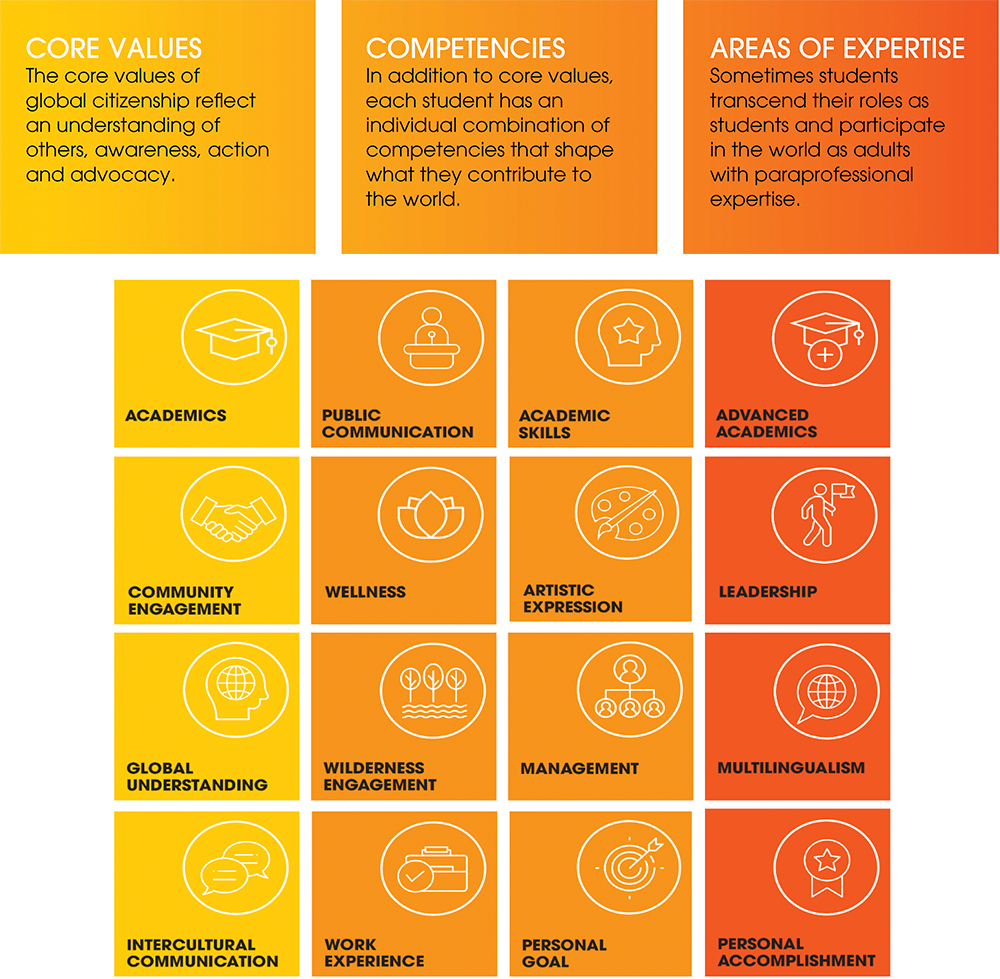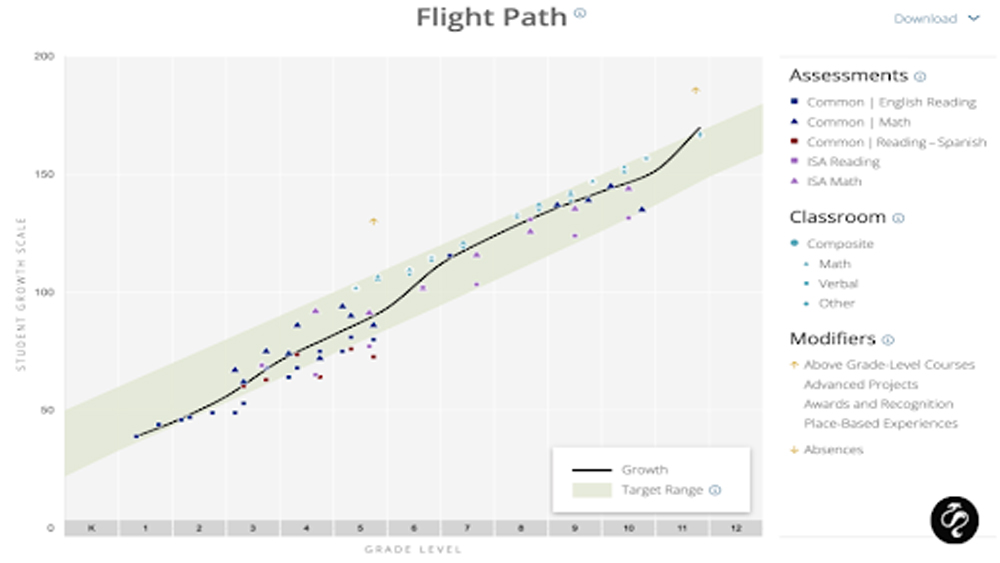
The Coalition to Honour all Learning (Ecolint) published a Call for Education Systems Reform in Spring 2024. This piece is part of a collection of articles highlighting efforts to shape the educational landscape in such a way that reform is more likely.
Sometimes a good place to start is the end. If our goal is reshaping secondary education, the end is graduation and, often, admittance to a university or additional program. That process requires presenting your track record.
In our previous article, Ellen Heyting and Irina Lupu introduced us to Melbourne Metrics and the Ecolint Learner Passport, emphasizing that their work is intended to reshape the priorities in high schools by telling new and different stories about high school graduates. It matters what we report on transcripts, because that informs what we emphasize in the high school curriculum and how universities and other organizations perceive the learning accomplished in high school.
It is only common sense that universities would most like to accept high school graduates who are well-rounded, lateral thinkers, young people who know how to lead (and follow!), have practical experience directing their own learning, and show promise in academic areas. The reliance in the university admissions office on standardized test scores is not because tests are the only thing universities are interested in. Test scores are a convenient proxy for future student success. But oftentimes those of us working in high schools let this proxy narrow our focus to test scores at the expense of many other worthwhile, even critical, skills.
So now we turn to Ellen Thorne who works with the well-established Global Citizen Diploma, and Austin Volz and Dr. Julia Higdon who tells us about a recent project in broadening assessment, Flight Path.
Global Citizen Diploma: Their Stories Are More Than Numbers
The Global Citizen Diploma (GCD) was established in 2011 at Yokohama International School (YIS) in response to the limitations of traditional transcripts. The pioneering group of educators who established the GCD recognized that the numbers on a transcript offer little insight into what a student values, the skills they possess, their interests, or their passions. In fact, transcripts provide little information about actual learning. These educators aimed to honor and recognize the full spectrum of student learning, both in and out of school, through the creation of a portfolio-based high school credential.
The competence framework was developed with the intention to recognize the core values of global citizenship - global understanding, intercultural communication, and community engagement - while also showcasing the combination of competencies and areas of expertise that are unique to each individual and how they contribute to the world.

Students submit a portfolio that captures their individual story and celebrates their growth by sharing their learning journey, reflections, and artifacts of learning. This holistic approach allows for assessment based on students’ real-world applications of knowledge and their commitment to positive change. The portfolio can also be a valuable tool for sharing achievements with a wider audience; many of our students include a link to their portfolios when applying for higher education, internships, or job opportunities. Additionally, each student’s level of achievement and competencies are documented on their traditional school transcript.
While the portfolio itself is significant, the process of creating it is equally important. Through intentional reflection, students gain a deeper understanding of who they are and what they value. The metacognitive skills that they develop during this process are invaluable, serving students well beyond their formal education.
Since its origin at YIS, the Global Citizen Diploma has grown into a consortium of ten like-minded schools across five continents. These institutions are committed to working in partnership with students to share their stories and connect across cultures. The GCD is not just a credential; it is a true partnership between schools that are committed to being agents of change. The GCD represents a step toward reimagining education for today and for the future. By emphasizing skills over scores, we aim to empower students to become proactive members of society, equipped to tackle the global challenges we face. As more institutions adopt these approaches, the potential for meaningful educational change becomes increasingly achievable.
Redefining the Report Card: How a Picture is Worth a Thousand Data Points
Higher education admissions departments are tasked with a tough job: predicting the future. In reviewing applications, they need to decide if a student will succeed in their program. Ideally, significant time would be available to make that decision. However, admissions departments generally receive far more applications than they can accept, which places a premium on efficiency. As a result, their decisions rely on evidence such as report cards, standardized tests, and extracurriculars. This efficient approach comes at a cost; students who could potentially succeed may be overlooked.
AEON School has developed Flight Path as an alternative. Flight Path takes isolated learning data—both qualitative and quantitative—and synthesizes them into a picture of student growth over time.

The target range in Flight Path is derived from the profiles of actual students who have thrived at the school, applying statistical analysis to learning evidence such as report card grades, assessments, and experiences like independent projects or study abroad.
Prior to graduation, Flight Path enables administrators, families, teachers, and students to align around if a student’s needs are being met and to change course if needed. As part of the higher education admissions process, Flight Path can support decision making by providing an efficient overview of all learning data, not only at the time of application, but also for the entirety of the student’s time at the school.
Flight Path offers schools a low-risk way to build trust in new forms of evidence (such as portfolios and projects) by presenting them alongside evidence that is traditionally used by admissions departments (such as report cards and standardized assessments). And it does so without requiring schools to adopt new pedagogies, learning outcomes, or assessments.
Although the graph above shows items like the International Schools' Assessment (ISA) scores, classroom grades, and math assessments, Flight Path can be built using any learning evidence available at a school. At AEON School, we use a wholly independent curriculum that is interdisciplinary and project-based, not Advanced Placement, A-Levels, or International Baccalaureate. Graduates are currently attending selective schools such as Columbia, Stanford, University of Chicago, Cornell, New York University, and Wellesley.
For any school working to change end-of-program secondary reporting, our advice would be to lead with empathy, focusing on ensuring that college admissions offices receive information that they can use both holistically and efficiently. We’d also suggest collaborating with others, and we’re happy to talk.
Innovating Our Education Systems
The Global Citizen Diploma and Flight Path are capturing a bigger view of what it means to be a young person in our schools, learning far more than academic subjects, being far more than the sum total of test scores. Initiatives that we highlight in this and the previous article, including the Melbourne Metrics and the Ecolint Learner Passport, are of course not the only attempts to broaden transcripts. For example, the Personal Capacity Transcript of the St. Andrew’s Institute of Learning was brought to our attention after the previous article was published.
Please let us know of your efforts to go beyond traditional reporting. Your work is important; together we can nudge education in a new direction.
Read more about How Are We Innovating Our Education Systems for Lasting Change? and Transcripts: Melbourne Metrics and Ecolint Learner Passport.
Ellen Thorne is the Global Coordinator for the Global Citizen Diploma Consortium. She has been an international school educator for over 20 years specializing in student leadership, service learning, global citizenship, and history education.
LinkedIn: Ellen Thorne
Austin Volz is the Product Lead at AEON Learning Sciences. He is also the co-author of The Elements of Education for Teachers and The Elements of Education for Curriculum Designers.
LinkedIn: Austin Volz
Dr. Julia Higdon is the Vice President of Research, Analytics, and Measurement at AEON Learning Sciences. She is also the co-author of The Elements of Education for Teachers.
LinkedIn: Julia Higdon
Paul Magnuson founded the educational research program at Leysin American School and teaches international education at Moreland University. He is a frequent TIE blogger.